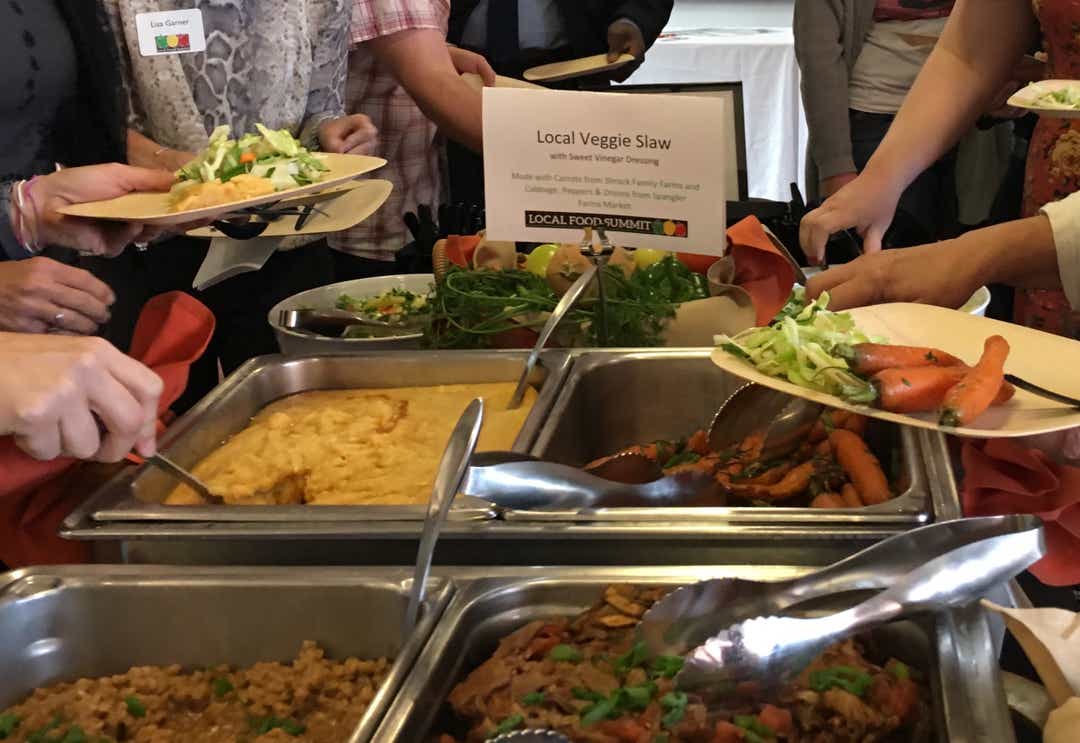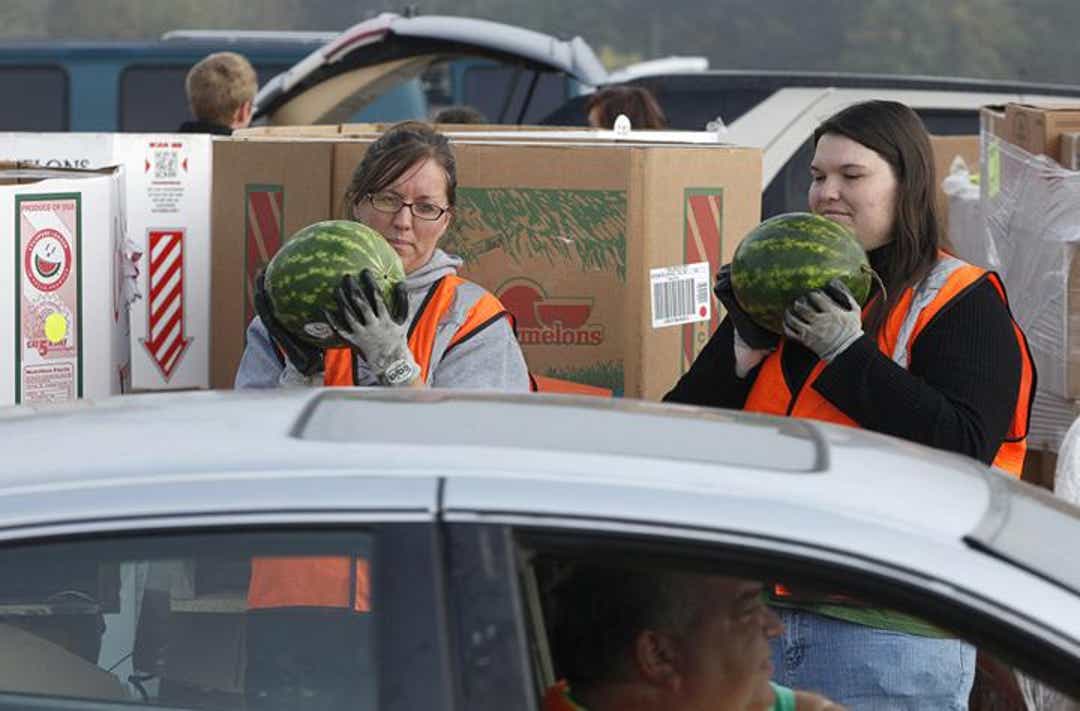
(Editor's note: Matt Rayburn was quoting the Patachou Foundation talking about food itself being "a distribution issue, not supply … " An earlier version of this story reported that Rayburn called food insecurity a distribution issue, not a supply issue).
MUNCIE, Ind. — While a lot is being done at the local level, the state of Indiana is doing little to help communities increase the availability of fresh and affordable local food, state Sen. Tim Lanane, D-Anderson, said earlier this month at the fourth annual Local Food Summit of Muncie and East Central Indiana.
Local efforts here include soup kitchens, food pantries, community gardens, rescuing food thrown out by restaurants, food giveaways known as tailgates, and neighborhood food boxes resembling the little free library boxes around town.
"If you had mentioned food insecurity or food desert maybe 10 years ago, a lot of people would say, 'What are you talking about?' " Lanane said.
The bankruptcy of Marsh Supermarkets was a wake-up call for many state lawmakers, including Lanane, who lived less than half a mile from a Marsh that closed, leaving the entire west side of the city "within that well-defined definition of a food desert," Lanane said.
More than one out of every 10 Hoosiers is deemed food insecure, meaning they're living with food-access problems or limitations. It's an issue in both rural and urban areas and in every county.
In Muncie, which Lanane represents, the problem is most acute on the northeast side, in off-campus areas near Ball State University, in neighborhoods around downtown, and in the Industry neighborhood north of Heekin Park.
"I'd say for at least 10 years now, we've realized there is something the state could do to help this," Lanane said during the summit hosted by Ball State University. "We just haven't been able to legislate anything up to this point in time."
The most the Legislature has been able to do so far, he said, was to assign the matter to an interim study committee that met twice in 2017.

The committee heard testimony from food bank, rural health, minority health, retired persons, farmers market and wellness advocates.
Matt Rayburn, deputy executive director of the Indiana Housing and Community Development Authority, quoted the Patachou Foundation talking about food itself being "a distribution issue, not supply … "
He told the committee that IHCDA, chaired by Lt. Gov. Suzanne Crouch, was "willing and strongly capable" of administering a statewide healthy food financing initiative including grants, loans and tax credits.
In addition, Phil Black, deputy executive director of the Community Investment Fund of Indiana, told the committee "there are several ways we can attack this issue," including applying for federal funds to match local healthy food initiatives, and working with banks and foundations to finance entrepreneurial initiatives like food trucks and micro-grocery stores.
Sen. John Ruckelshaus, R, Indianapolis, who chaired the committee, spoke about "empowering the office of lieutenant governor to have ownership of" and "shepherd forward this issue."
During the next session of the General Assembly, Ruckelshaus authored a bill to establish the "Access to Nutritious Food Program," which would fall under the jurisdiction of the IHCDA. The program's purpose was to focus on the distribution of fresh and nutritious food as well as education in food preparation and nutrition in food deserts.
"After taking an in-depth look at this issue during the summer, we found that there was a serious distribution problem with fresh food," Ruckelshaus said in a news release in January of 2018. "This bill would support the vibrant non-profit sector that helps combat food deserts so that more Indiana residents can get fresh, nutritious food."
The bill also required IHCDA to hold an annual meeting to assess the program's performance.
The bill passed the Senate by a vote of 46-3. But when it was referred to the House, it was assigned to the Ways and Means Committee, where it died for lack of a hearing.
► Marsh Supermarkets through the years, a photo gallery
Also in 2018, Sen. Greg Taylor, D-Indianapolis, authored a bill to allow a county to impose an additional sales tax in an area designated as a special food-desert district. The funds could be used to finance healthy food projects. The bill did not get a hearing and died.
Also in 2018, Rep. Robin Schackleford, D-Indianapolis, authored a bill to create a "New Markets Healthy Food Access Investment Credit" against state tax liability for projects to increase the availability of and capacity to supply fresh food to low-income areas. It, too, died in the Ways and Means Committee.
►EARLIER COVERAGE: Living in Muncie's food desert
This year, Taylor re-introduced his sales-tax-district for healthy-food-programs legislation, which again died for lack of a hearing. Also in 2019, Shackledford filed a bill to establish the healthy food financing fund and the health food financing program under the administration of IHCDA. It did not get a hearing in Ways and Means.
Lanane indicated some members of the General Assembly have questioned how big of a problem food insecurity is, considering the safety net provided by the federal Supplemental Nutrition Assistance Program, formerly known as the food stamp program.
But a third of the food-insecure population doesn't qualify for SNAP, Lanane said, "so we have a gap there that we need to address."

Rep. Sue Errington, D-Muncie, who also spoke at the local food summit, told The Star Press she doesn't expect any food-security bills to be considered in the upcoming, "short session" of the Legislature next year. The issue will surface again, however, during the next "long session" of the Legislature, in 2021, when the state's next biennial budget is adopted, she said.
"These individuals are not statistics," Ball State President Geoffrey S. Mearns said during the local food summit. "They are our neighbors and our friends. Many of them … are children, and many of them are seniors."
The summit was sponsored by the Muncie Food Hub Partnership, Purdue University Extension, and the Delaware County Food Council.
About 100 people attended (75% female). A fourth of the crowd was from the nonprofit sector. Community members, farmers, educators, grocers, chefs and local government, economic development and tourism officials also were represented.
Mearns applauded the Food Hub Partnership — a project of Ball State’s Natural Resources and Environmental Management department (NREM) — which was created to break down food access barriers and aid local farmers. The partnership's initiatives include a food trailer that provides fresh produce in local food deserts.
The partnership buys locally grown food from farmers at fair prices and sells it out of a trailer in food deserts around town as cheaply as possible, says Josh Gruver, an associate professor in the NREM department.
"We take advantage of federal food assistance programs, like WIC, Senior Farmers Market Nutrition Program, IU Health Bucks, to reduce the costs of our products for participating customers," he said via email.

"We are also the primary host of the local food summits, to keep all the various groups connected and communicating, to raise awareness, (and) to help educate people, " Gruver went on.
Examples of other local food security initiatives:
• Delaware County Food Council's "food rescue" and "farm-to-school" programs. The former is working to transfer/donate end-of-day leftover food from restaurants to soup kitchens and so forth, rather than wasting it. The latter programs seeks to supply local schools with produce from local growers.
• Second Harvest Food Bank provides products to food pantries across East Central Indiana and also sponsors food giveaways called tailgates.
• Several churches and soup kitchens provide daily and/or weekly hot meals to food insecure people.
• There are numerous food pantries in the region, along with several "free little pantry" food boxes, similar to the "free little library" box concept.
• Community gardens provide plots on which people can grow their own food, while some community gardens provide food for people just to take.
• The 8Twelve Coalition is figuring out how to locate a store or food co-op in the Thomas Park/Avondale neighborhood. IU Health is getting involved.
Contact Seth Slabaugh at (765) 213-5834 or seths@muncie.gannett.com.
"Healthy food" - Google News
December 01, 2019 at 02:00AM
https://ift.tt/2Y3beHx
Amid local efforts to address food deserts, is there more the state should do? - The Star Press
"Healthy food" - Google News
https://ift.tt/2plGeWz
Shoes Man Tutorial
Pos News Update
Meme Update
Korean Entertainment News
Japan News Update
Bagikan Berita Ini














0 Response to "Amid local efforts to address food deserts, is there more the state should do? - The Star Press"
Post a Comment